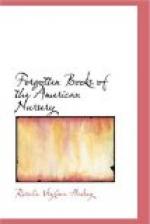Fables have always been a mine of interest to young folks, and were interspersed liberally with all moral tales, but “Entertaining Fables” bears upon its title-page a suggestion that the children’s old friend, “Aesop,” appeared in a new dress.
Another series of books contained the much abridged novels written for the older people. “Peregrine Pickle” and “Roderick Random” were both reprinted by Isaiah Thomas as early as seventeen hundred and eighty-eight. These tales of adventure seem to have had their small reflections in such stories as “The Adventures of a Pincushion,” and “The Adventures of a Peg-top,” by Dorothy Kilner, an Englishwoman. Mention has already been made of “Pamela” and “Clarissa” in condensed form. These were books of over two hundred pages; but most of the toy-books were limited to less than one hundred. A remarkable instance of the pith of a long plot put into small compass was “The History of Tom Jones.” A dog-eared copy of such an edition of “Tom Jones” is still in existence. Its flowery Dutch binding covers only thirty-one pages, four inches long, with a frontispiece and five wood-cut illustrations. In so small a space no detailed account of the life of the hero is to be expected; nevertheless, the first paragraph introduces Tom as no ordinary foundling. Mr. Allworthy finds the infant in his bed one evening and rings up his housekeeper Mrs. Deborah Wilkins. “She being a strict observer of decency was exceedingly alarmed, on entering her master’s room, to find him undressed, but more so on his presenting her with the child, which he ordered immediately to be taken care of.” The story proceeds—with little punctuation to enable the reader to take breath—to tell how the infant is named, and how Mr. Allworthy’s nephew, Master Bilfil, is also brought under that generous and respectable gentleman’s protection. Tommy turned out “good,” as Mr. Allworthy had hoped when he assumed charge of him; and therefore eventually inherited riches and gained the hand of Miss Sophia Western, with whom he rode about the country in their “Coach and Six.”
Of the stories in this juvenile library, the names, at least, of “Giles Gingerbread,” “Little King Pippin,” and “Goody Two-Shoes” have been handed down through various generations. One hundred years ago every child knew that “Little King Pippin” attained his glorious end by attention to his books in the beginning of his career; that “Giles Gingerbread” first learned his alphabet from gingerbread letters, and later obtained the patronage of a fine gentleman by spelling “apple-pye” correctly. Thus did his digestion prove of material assistance in mental gymnastics.
[Illustration: Illustration of Riddle XIV in “The Puzzling-Cap"]




